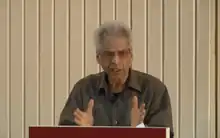Gyanendra Pandey (historian)
Gyanendra Pandey (born 1949) is a historian and a founding member of the Subaltern Studies project.
Gyanendra Pandey | |
|---|---|
 Prof.Gyanendra pandey at University of Hyderabad | |
| Born | 1949 |
| Alma mater | |
Early life and career
Pandey did his schooling in Sherwood College, Nainital, and completed his B.A. (Hons.) in history at St. Stephen's College, Delhi, ranking first in the first class. He completed his D.Phil. in South Asian history under the supervision of Tapan Raychaudhuri as a Rhodes Scholar at Nuffield College, Oxford. He was a research fellow at Lincoln College, Oxford, and later at Wolfson College, Oxford, from 1974 to 1978.
He was a lecturer in history at the University of Leeds and then at the University of Hyderabad, which were followed by a fellowship at the Centre for Studies in Social Sciences in Kolkata. In 1985 he became a professor at the University of Allahabad, moving to a similar position at the University of Delhi from 1986 to 1998. He was a professor of anthropology and history and chair of the Department of Anthropology at Johns Hopkins University.[1][2] Presently, he is a professor of history at Emory University, Atlanta, Georgia.[3]
Academic
Pandey has written widely on the subjects of South Asian and African-American history, on colonial and post-colonial themes, and on matters relating to subaltern studies.
He recently started a course at Emory University, US, combining Dalit history with that of African Americans.[4] He is known for his proposition that "all racism is upper caste racism." He states.
- "Upper caste, because ruling and dominant groups and classes across the globe believe it is their inherited right to rule and to live in special comfort and prosperity. Racism, because that is a way of keeping subordinated and marginalized groups – sometimes called minorities – "in their place;" and because the assumption of the right to rule, property and 'culture' leads to the segregation and subordination of those without privileged access to these, and to their denigration, castigation and even expulsion at times when they are seen as challenging the existing order of caste and race, Black and White."[5][1]
Select publications
Books
- Pandey, Gyanendra (1992). The Construction of Communalism in Colonial North India. Oxford University Press. ISBN 0195630106.. Reissued in 2006, ISBN 0195683641; and in 2012, ISBN 0198077300.
Articles
- Pandey, Gyanandra (1988). "Congress and the Nation, 1917-1947". In Sisson, Richard; Wolpert, Stanley (eds.). Congress and Indian Nationalism: The Pre-Independence Phase. University of California Press. pp. 121–134. ISBN 978-0-520-06041-8.
- Pandey, Gyanendra, 'In Defence of the Fragment: Writing About Hindu-Muslim Riots in India', Economic & Political Weekly, Annual Number, march 1991, repr. in The Hunger of the Republic: Our Present in Retrospect, from the series India Since the 90s.
- Pandey, Gyanendra (1999). "Can a Muslim Be an Indian?" Comparative Studies in Society and History, vol. 41, no. 4, pp. 608–629.
- "Rallying Around the Cow" (published in Subaltern Studies, Volume II)[6]
References
- "Gyanendra Pandey". Emory University. Retrieved 18 September 2011.
- Pandey, Gyanendra. "Curriculkum Vitae: Gyanendra Pandey" (PDF). Retrieved 18 September 2011.
- "Gyanendra Pandey". history.emory.edu.
- Dalit literature goes global, Martand Kaushik, TNN, 5 Apr 2015
- Upper Caste Racism: The Marked and Unmarked Across the Globe, Historian Gyanendra Pandey analyzes the dynamics of racism worldwide, University of Chicago Talk Abstract
- Guha, Ramachandra (25 October 2015). "A 19th Century Politics For a 21st Century State". Hindustan Times.